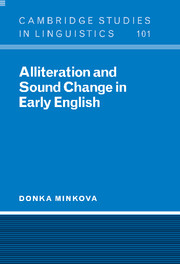Book contents
- Frontmatter
- Contents
- List of figures
- List of tables
- List of abbreviations
- Preface
- 1 Social and linguistic setting of alliterative verse in Anglo-Saxon and Medieval England
- 2 Linguistic structures in English alliterative verse
- 3 Segmental histories: velar palatalization
- 4 Syllable structure
- 5 ONSET and cluster alliteration in Old English: the case of sp-, st-, sk-
- 6 ONSET and cluster alliteration in Middle English
- 7 Verse evidence for cluster simplification in Middle English
- References
- Index of names
- Subject index
6 - ONSET and cluster alliteration in Middle English
Published online by Cambridge University Press: 22 September 2009
- Frontmatter
- Contents
- List of figures
- List of tables
- List of abbreviations
- Preface
- 1 Social and linguistic setting of alliterative verse in Anglo-Saxon and Medieval England
- 2 Linguistic structures in English alliterative verse
- 3 Segmental histories: velar palatalization
- 4 Syllable structure
- 5 ONSET and cluster alliteration in Old English: the case of sp-, st-, sk-
- 6 ONSET and cluster alliteration in Middle English
- 7 Verse evidence for cluster simplification in Middle English
- References
- Index of names
- Subject index
Summary
Turning to the practices of the Middle English alliterative poets with regard to onset clusters, we will continue to rely on the assumption that the selection of items to fit particular verse patterns is done with considerable discrimination. Verse composition draws on the available phonological material in the language; therefore the poetic choices provide an evidential basis for the reconstruction of features in the contemporary language, and a good testing ground for linguistic claims that are not period- or even language-specific. This chapter will look into the distribution of cluster alliteration in Middle English. The goal of this particular portion of the study is to establish the correlation between the composition of the onsets and their cohesive behavior in verse. Assuming that the phonetic and phonological determinants remained relatively constant, and that cluster alliteration is a good diagnostic of similarity, it will be interesting to see how well-formed clusters other than /sp-, st-, sk-/ are deployed in verse.
It is often recognized, and most cogently argued by Fulk (1992: 266–268, 286–287), that some aspects of Old English verse had become highly artificial by the time of the Norman Conquest. Whether linguistically or culturally induced, the distancing between the early and the late verse is apparent in the collapse of the classical rules of verse organization, in the reduced use of poetic compounds, and even in the changing conventions of what constitutes acceptable alliteration.
- Type
- Chapter
- Information
- Alliteration and Sound Change in Early English , pp. 238 - 310Publisher: Cambridge University PressPrint publication year: 2003



